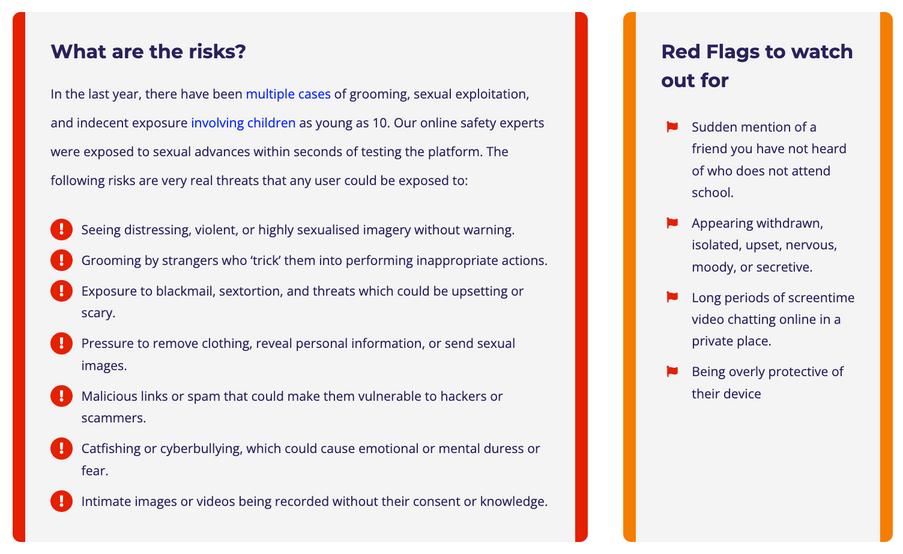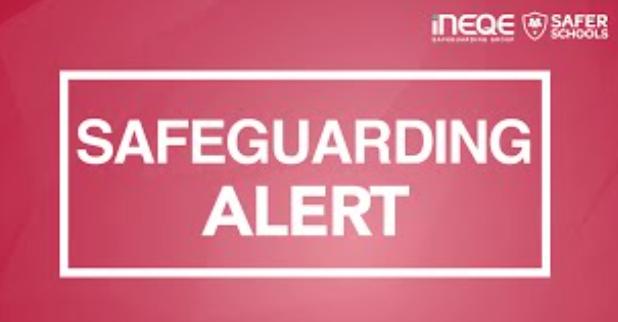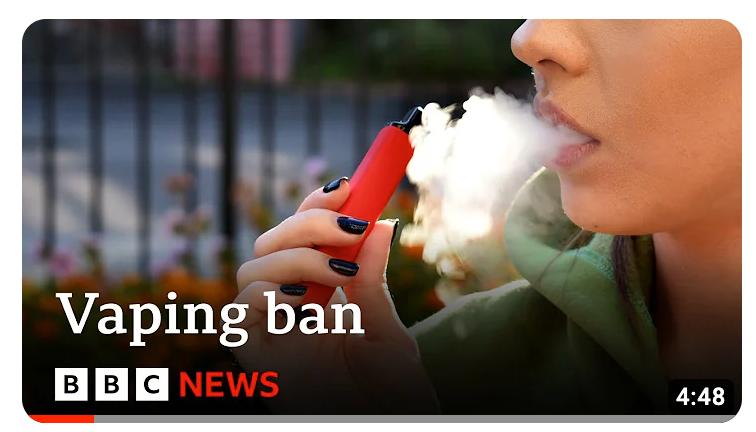TheSafeguardingTeam

 AnnaCutts DSL
MichelleLucasHalliwell DDSL
ChrisReid DDSL
AndrewHailes DDSL
AnnaCutts DSL
MichelleLucasHalliwell DDSL
ChrisReid DDSL
AndrewHailes DDSL
DSL@cheltenham
PaulHayes DDSL
college.org.uk
We have previously reported a dangerous online platform called Omegle and the risks it poses to children and young people who visit it. We know from speaking to some of our pupils that they are still accessing it so we have decided to release further information.




Omegle is a free anonymous online chatroom where users are randomly paired with strangers to chat via video call or instant messaging. It is popular, and is primarily accessed on a web browser Videos showcasing Omegle chats have popped up on platforms like Instagram and TikTok, which have added to its popularity with children and young people.

TIKTok has recently introduced Family Pairing, which allows parents to link their account with their child’s to control their settings remotely. For example, parents can turn on restricted mode and screen time limits and disable direct messages right from their own phone. Children cannot change these settings without parental approval.




CEOP has created resources aimed at parents to better eqip you to have conversations with your child about the Dark Web.

CEOP has also launched #AskTheAwkward? Young people are using online spaces for their social and romantic lives. They told us that they would like their parents and carers to talk with them more about this. We know that these topics aren’t always easy to talk about, so #AskTheAwkward has been created to help you to explore online relationships with your secondary aged children, making these conversations part of everyday life
 Press on the icon for parental control guides for Apple, Android and other devices
Press on the icon for parental control guides for Apple, Android and other devices
The Children’s Society has developed a new ‘Slang Dictionary’ which has been designed to support parents, carers and professionals to better understand the language young people may be using in order to support them and safeguard them Even if you feel the dictionary might not apply to your child, they may be explosed to such language online, particularly in chatrooms How many do you know?
The Slang Dictionary The Emoji Dictionary
The following are a list of TV programmes that highlight issues. Watching a programme like this can be a good starting point for a conversation with your child about a specific topic
Theme Title Programme

Online safety
The Secret World of Trading Nudes
https://www.bbc.co.uk/iplayer/episode/ m001bf69/panorama-the-secretworld-of-trading-nudes
Exploitation
Private ADHD Clinics Exposed
https://www.bbc.co.uk/iplayer/episode/ m001m0f9/panorama-private-adhdclinics-exposed
Online sexual harrassment
Emily Atack: Asking for It?
https://www.bbc.co.uk/iplayer/episode/ m001hs5v/emily-atack-asking-for-it
Cybercullying
Jesy Nelson: 'Odd One Out'
Domestic violence Abused By My Girlfriend
https://www.bbc.co.uk/iplayer/episode/ p07lsr4d/jesy-nelson-odd-one-out
https://www.bbc.co.uk/iplayer/episode/ p0700912/abused-by-my-girlfriend

If you have watched or listened to something that you would like to share with the safeguarding team, please email Michelle L-H (m lucas-halliwell@cheltenhamcollege org)


Absenteeism has become endemic in schools across the country Despite concerted efforts, absence rates are not improving. School absence was around 4.7% in the years before the pandemic struck, rising to 7.5% last year, according to Department for Education data. However, persistent absenteeism – where pupils miss 10% or more classes – has more than doubled in the UK, rising from 10 9% in 2018-19, to 22 5% last year, which equates to 1.6 million pupils, and the number is not going down. Attendance data for last academic year up to thr 31st of March 23, shows the rate was 22.6%.
One of the theories as to why more children are regularly missing school is that lockdowns made missing school permissible for many, They were forced to spend so much time at home when they should have been socialising Many don’t want to leave the security and safety home offers Many schools, especially those in the independant sector was able to provide such excellent access to online learning via platforms such as Teams that pupils find it hard to undersatand why they have to go back to face to face learning
How does attendance affect outcomes for pupils?
Every moment in school counts, and days missed add up quickly. For example, a child in 4th form who is absent for three days over a half term could miss 24 lessons in total The higher a pupil’s attendance, the more they are likely to learn, and the better they are likely to perform in exams and formal assessments Being around teachers and friends in a schoolis the best way for pupils to learn and reach their potential. Time in school also keeps children safe and provides access to extra-curricular opportunities and pastoral care
Your child has a medical appointment that cannot be arranged outside of school hours

Your child has fallen out with friends. They need to talk to us to help solve the problem instead of avoiding it
You child is unwell with a temperature or a rash

Your child has had a bad night's sleep, it will not help to let them sleep in as that will interrupt their circadian rhythm Is poor sleep is a persistant problem, speak to us as we can help

You child is unwell with sickness/diarrheoa

Some yong people find it extremely hard to cope away from their tech or from gaming. If this is becoming a problem, talk to us for advice and help



Your child has a headache One of the most common reasons for this is dehydration Make sure they have a drink to bring with them and take painkillers before school


Next time your child is keen to avoid school, here are some things that you can do to help -
Early intervention is important, as the longer children are away from school, the harder it can get for them to return
Reach out, as soon as you can Contact your child's tutor or HsM They can offer help and advice or refer to you to the Safeguarding Team.
Focus on talking, listening, emphasising and reassuring. If it is hard for you to talk to your child (and this can be understandable), see if there is someone who can act as an intermediary. Young people are more likely to have a heart-to-heart with somebody where there is no history of conflict and no emotional baggage

Follow a routine, If your child’s reluctance is stemmed from anxiety, a calm, familiar routine can help with security and stress reduction
Stick to the plan, for at least half a term It is important to have some consistency because that will increase the child’s sense of security and give them a routine. It also gives all parties the chance to evaluate the success of the strategy
If you would like more information on this subject, contact the safeguarding team and/or watch the following
If you think that your teen vaping is better than smoking – think again!

Vapes were hailed as miracle devices to help adults stop smoking However, vaping has invaded the high street and, more worryingly, schools. They often come in brightly-coloured packaging, in innocentsounding flavours, such as watermelon and candy floss, so it is no surprise that vaping has proved enticing to teens and even younger children.
Addicted children can barely make it through lessons before they have to duck out for a vape, and this becomes particularly problematic when it comes to exams However, it is not simply the addictive nature of nicotine-infused e-cigarettes that is proving to be a problem: now, we are seeing children as young as nine showing up in hospital with lung and DNA damage Among those who have never smoked and who vaped exclusively, the frequency of vaping and the use of certain popular devices and flavours were associated with the highest levels of DNA damage, according to new research from the Keck School of Medicine. Researchers from the US tracked the respiratory health of young people in the Southern California Children’s Health Study. They concluded that that vaping was associated with respiratory symptoms .
Young people are particularly at risk
In August, it was reported that the latest figures from NHS England reveal that in the past year there were 15 cases of under-nines being hospitalised with injuries ranging from bleeding lungs to lung collapse And this is all before you even consider the risk of inhaling vapes spiked with other substances In June, a 51-year-old man was arrested on suspicion of attempting to poison a woman by offering her a puff on a spiked vape at the Isle of Wight festival.
Vapes are becoming steadily more common with younger age groups According to the latest statistics from the Action on Smoking and Health (ASH) group, nearly 21% of UK children aged 11-17 have tried vaping, up from 14% in 2020
Dr Gareth Nye, a lecturer in physiology and researcher at Chester Medical School, says that one of the dangers that vapes pose to anyone, from children to adults, is that the chemicals within them can initiate a powerful autoimmune reaction within the lungs, causing damage over time “Whenever we put something into our body that the immune system doesn’t recognise, it aims to remove it from the body for our own protection,” he says. “In the process of removing foreign bodies, our immune system damages healthy cells, which over time leads to a loss of that tissue. This occurs with all vaping products, as with conventional cigarettes”

Experts also say that the range of sweet flavours – from strawberry to banana, bubblegum, vanilla and even doughnut – ease of use and nicotine content mean that children and teenagers use them excessively They are also far cheaper than cigarettes, with some disposable vapes costing as little as £4.99, and online stores offering deals such as five for £20

Nicotine - While nicotine is perhaps only 0 3-2 % of a vape, it is the main chemical culprit that makes these products so dangerously addictive. A smoker typically absorbs between 1-2 milligrams of nicotine from a single cigarette. Some of the most high-strength disposable vapes on the market, while still falling under UK regulations, contain 20mg/ml of nicotine. Finishing the vape – about 600-800 puffs –works out about the same as smoking up to two packs of 20 cigarettes.
One of the major problems with nicotine is that it can alter the development of the growing brain and initiate problems that then persist into adulthood “You see that attention, the ability to focus and impulsive traits are all different when people are exposed to nicotine during childhood,” says Huib Mansvelder, professor of neurophysiology at Vrije Universiteit, in Amsterdam Dr Nye also predicts that children who vape regularly will be more at risk of various chronic illnesses in decades to come “Dentists are reporting increases in gum-tissue problems, as nicotine constricts blood vessels, including those in the oral cavity,” he says “It can be assumed this is occurring in other areas of the body, suggesting that young people using these products are at an increased risk of heart attacks, strokes, cancers and other diseases at an earlier stage in their lives.” Please

Our health centre have nurses who are trained in helping young people overcome their vaping addiction If you have any questions or concerns, please contact them direct on nurses@cheltenhamcollege org uk

click here to access the the whole article






 AnnaCutts DSL
MichelleLucasHalliwell DDSL
ChrisReid DDSL
AndrewHailes DDSL
AnnaCutts DSL
MichelleLucasHalliwell DDSL
ChrisReid DDSL
AndrewHailes DDSL







 Press on the icon for parental control guides for Apple, Android and other devices
Press on the icon for parental control guides for Apple, Android and other devices
















